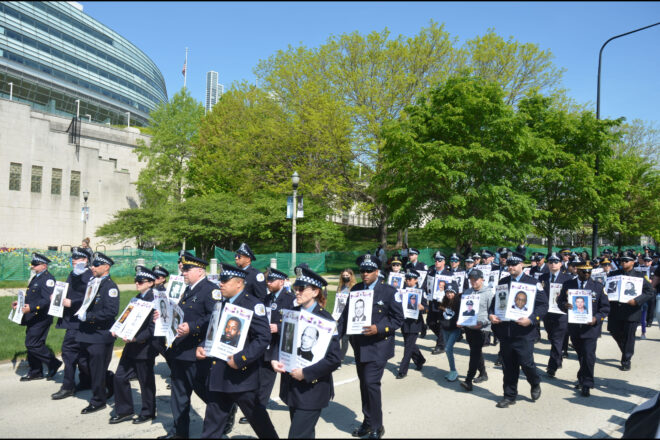The Illinois Association of Chiefs of Police (ILACP) has published an article from our founder, Thomas Lemmer, in the Winter 2025 issue of Command Magazine. The article is entitled, Police Leaders Need to Do Better on Gratitude. The article is a companion resource and follow-up to the executive training Lemmer conducted for ILACP members. This training was first presented at the ILACP annual conference held in April 2025. This training was also subsequently provided at the 2025 Midwest Security and Police Expo, the 2025 Breaching the Barricade Conference, and via a live webinar hosted by the Illinois Law Enforcement Training and Standards Board (ILETSB) Executive Institute. [Click the link to read more | 22 Dec 2025]
Category: Training Insight
The articles highlighted below provide topic-specific leadership lessons from Thomas Lemmer, the founder of Secure 1776 and veteran law enforcement officer, supervisor, and executive.
Secure 1776 also provides direct client training, consulting, research, and analytical service options. Core areas of expertise include community policing, juvenile crime, gangs, violence, patrol operations, police and public safety policy development, internal investigations, supervisory engagement, and management accountability. Go to our Training and Consulting Services Tab now to learn more.
The Essential Police Policy Principles
Leadership is always a much discussed topic and concern within the law enforcement profession. Leadership is a complex and dynamic topic. In such discussions, the styles of those tasked with leadership responsibilities are often the primary focus. Yet there is style, which is important, and then there is substance. Often overlooked are the mechanics of the formal leadership processes that guide the functions and operations of an agency. If a chef’s recipes can make or break a restaurant, which they can, so too should we view the policies of a police agency. A bad recipe can leave a bad taste, or worse. A bad policy can undermine a department’s operations, or worse – much worse. Bad policies can destroy officer morale, misdirect resources, complicate procedures, create inefficiencies, and impede effectiveness. Bad policies can cost millions in civil damages, litigation defense, and remediation efforts. In policing, officer safety should always be a priority concern, and bad policies can, and do, place individual members at risk. Bad policies can cost lives. Bad policies can also undermine the very public safety mission of a police department. Even as all of this is true, policy development is often foolishly approached much like art. The untrained observer is left to just know supposedly good policy when they see it. Such is a recipe for disaster. Thankfully, there is a better approach for police policy development. [Click the link to read more | 29 Jul 2022]
ILACP Publishes Article on Lemmer’s Supervisory Engagement Model
The Illinois Association of Chiefs of Police (ILACP) has published an article from our founder, Thomas Lemmer, in the Summer 2022 issue of Command Magazine. The article is entitled, Introduction to the Eight Levels of Supervisory Engagement. The article is a follow-up to the executive training Lemmer conducted for ILACP members, at their annual conference held in April 2022, on his supervisory engagement model. The article begins with an exchange Lemmer had with an uninspiring sergeant early in his career. Of this interaction, he remarked: “I have worked in public safety positions for forty years, of which more than 34 years were with the Chicago Police Department (CPD), including nearly a quarter of a century as a supervisor. I remain inspired by that day’s vivid example of what supervisory excellence does not look like.” Lemmer advises that just as what police officers do matters: “What we do as police supervisors and executives matters as well.” To this end, his model also provides 19 separate leadership response strategies to be used in fostering an environment of supervisory excellence within law enforcement. [Click the link below to read more | 13 Jul 2022]
Handling Complaints Against the Police
Chicago has a need for clarity on the basics of handling complaints against the police. This need was apparent during the Chicago City Council process reviewing the nomination of Ms. Andrea Kersten to permanently head the Civilian Office of Police Accountability (COPA). COPA is the city’s civilian agency tasked with investigating most serious allegations of police misconduct. During the 21 January 2022 Public Safety Committee Hearing reviewing the Kersten nomination, Alderman Anthony Napolitano raised this issue. The alderman specifically noted that under Ms. Kersten, COPA has shown a pattern of overreach and non-proportionality. Ms. Kersten was then the acting head of the agency, and she was previously its Chief of Investigative Operations. This “Insight” posting is intended to provide clarity on the approach that should be utilized in the necessary work of investigating allegations of police misconduct. Such is essential to the larger objective of public safety. In handling complaints against police officers, those assigned to investigate must distinguish between error (even tragedy) and true misconduct. The process should also seek to advance five key pillars: truth, fairness, respect, improvement, and proportionality. Each of these five elements is essential to advancing the legitimacy within the process that simultaneously meets the needs of the community, department, and the officers. [Click the link below to read more | 26 Feb 2022]


